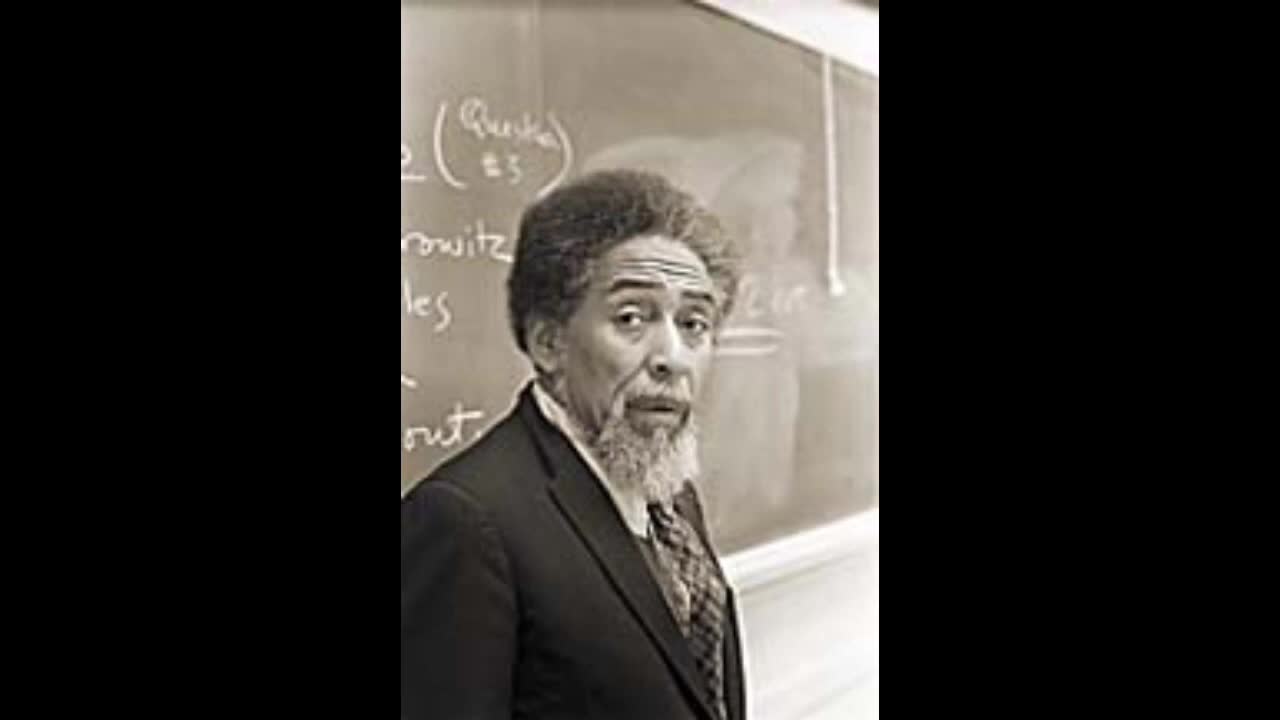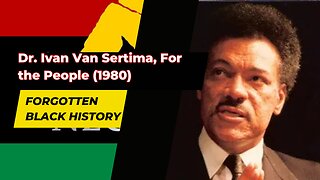Premium Only Content

Black History: ST.CLAIR DRAKE (1911-1990)
John Gibbs St. Clair Drake was an American anthropologist and sociologist and the founding Director of Stanford University’s African and African American Studies Department in 1968. Drake was born in Suffolk, Virginia on January 2, 1911. Drake’s father immigrated to the United States from the Barbados in 1904, and studied at the Virginia Theological Seminary and College in Lynchburg, and upon graduation became a Baptist Preacher. Drake’s mother, Bessie, was a devout churchwoman born in Virginia. When his parents divorced Drake moved to live with his father in Staunton, Virginia. A few years later Drake accompanied his father to Pittsburgh, Pennsylvania in 1916 when the Rev. Drake continued ministering to his African American congregants who migrated north. Drake later returned to Staunton, Virginia to live with his mother, who had separated and later divorced his father in 1924.
In Virginia Drake began to experience racial segregation. He attended segregated Booker T. Washington High School in Staunton and in 1927 enrolled at the Hampton Institute. At Hampton Drake met William Allison Davis, who had recently earned an M.A. in English from Harvard University in Massachusetts and who was teaching literature at the Institute. Davis became Drake’s mentor and the two remained professional colleagues and personal friends for decades. Drake graduated from Hampton in 1931 with a degree in biology and after graduation he received a one-year scholarship to study peace and race relations at the Quaker Graduate School at Pendle Hill in Pennsylvania.
In 1935, Allison Davis asked Drake to work in Natchez, Mississippi, as an interviewer for the research project he and Burleigh and Mary Gardner were working on for their book Deep South. Drake interviewed lower class black residents in Mississippi while Davis and his wife concentrated on the black upper classes in Natchez. This research encouraged Drake’s later work in Chicago, Illinois’s black community.
In 1935, Drake began teaching anthropology at Dillard University and divided his time between teaching and interviewing in Natchez. Realizing that he required more intensive training in anthropology Drake entered the graduate program at the University of Chicago. Drake’s attendance at the University of Chicago was interrupted by his enlistment in the U.S. Merchant Marines in 1939. In 1942 Drake married Elizabeth Johns, a sociologist. He served in the Merchant Marines throughout the duration of the war and was discharged in 1945. He returned to the University of Chicago and completed his Ph.D. in 1953.
Drake’s other works included Churches and Voluntary Associations among Negroes in Chicago (1940) and Black Metropolis: A Study of Negro Life in a Northern City. Black Metropolis (1945) was co-authored with Horace R. Cayton. The latter study received the Ainsfiled-Wolf award in 1945 as one of the years’ two best books on race relations in an American city.
In 1946 St. Clair Drake received a tenured teaching appointment at Roosevelt College (now university). While at Roosevelt he helped create their African American Studies program. Drake remained at Roosevelt until 1968. Later that year he was asked to lead the development for an Afro American studies program at Stanford University. While at Stanford, he published Black Folk Here and There (2 vols. 1987-1990) an exhaustive and detailed accounting of white racism in world history. Drake was also a poet and actor and served as an advisor to President Kwame Nkrumah of Ghana. St. Clair Drake died at the age of 79 in Palo Alto, California on June 21, 1990.
-
 1:01:09
1:01:09
Forgotten Black History
4 months agoDr. Ivan Van Sertima, For the People (1980)
1403 -
 1:45:48
1:45:48
Glenn Greenwald
14 hours agoGlenn Reacts to News of the Week; Plus: Audience Q&A | SYSTEM UPDATE #443
112K81 -
 11:05:38
11:05:38
Dr Disrespect
19 hours ago🔴LIVE - DR DISRESPECT - PUBG - 5 CHICKEN DINNERS CHALLENGE
229K21 -
 3:23:12
3:23:12
I_Came_With_Fire_Podcast
18 hours agoSHALL NOT BE INFRINGED| THE TYRANNY OF UNELECTED BUREAUCRATS | XI BOWS
51.8K9 -
 4:19:36
4:19:36
SynthTrax & DJ Cheezus Livestreams
20 hours agoFriday Night Synthwave 80s 90s Electronica and more DJ MIX Livestream THE GREAT EDO WARS OF 2067 Edition
85.3K10 -
 4:45:15
4:45:15
RalliedLIVE
10 hours ago $1.85 earnedWarzone Domination w/ Ral
60.8K1 -
 1:10:17
1:10:17
Sarah Westall
12 hours agoWorld Leaders Increasingly Display Panic Behavior as Economic Change Accelerates w/ Andy Schectman
90.2K18 -
 59:54
59:54
Motherland Casino
9 hours ago $2.14 earnedScar x Ayanna
38.9K7 -
 41:57
41:57
BonginoReport
14 hours agoProtecting Kids From WOKE Ideology in School (Ep. 35) - Nightly Scroll with Hayley Caronia -04/25/25
126K51 -
 7:17:12
7:17:12
SpartakusLIVE
12 hours agoFriday Night HYPE w/ #1 All-American Solo NUKE Hero
32.1K